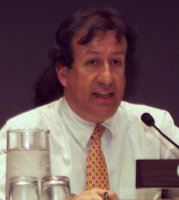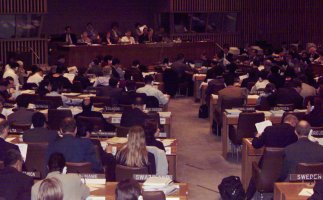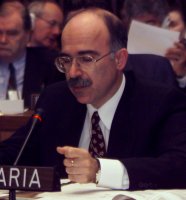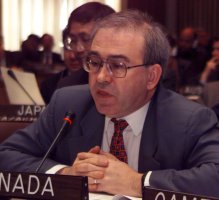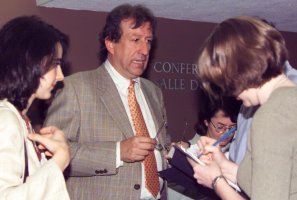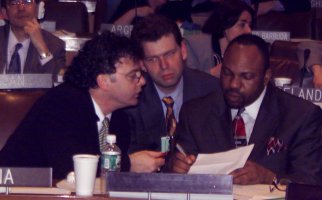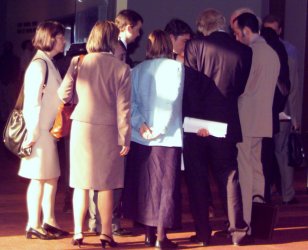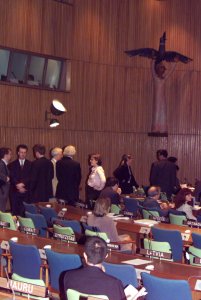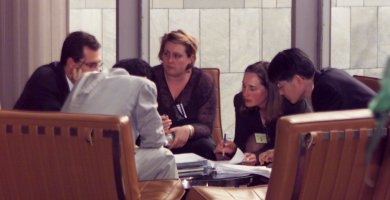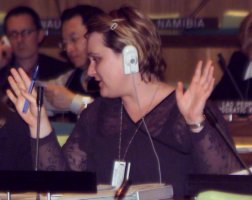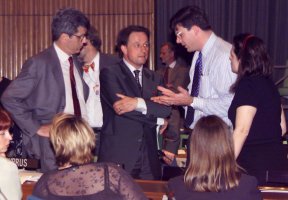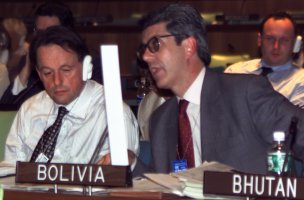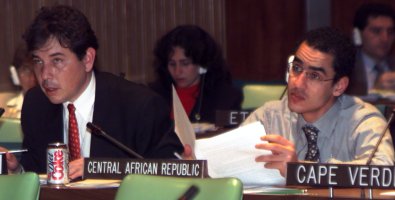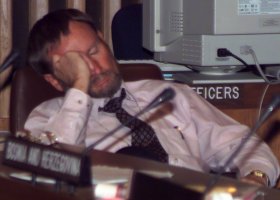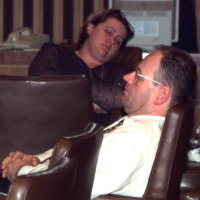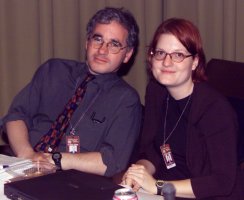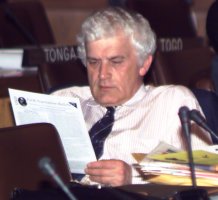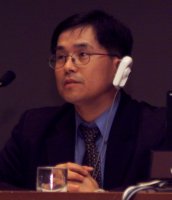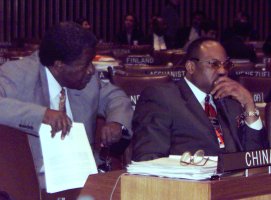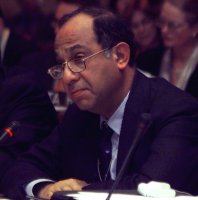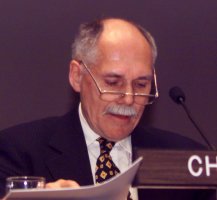| |
Plenary and Closing Remarks from CSD-8 Chair Minister
Juan Mayr: Chair Mayr suspended the Closing Plenary and announced
plans for Drafting Groups I and II to reconvene to complete their
work.
|
 CSD-8
Chair Juan Mayr (Colombia) closed the Plenary early, and
extended time for Drafting Groups to continue with their work.
Mayr shared his vision and some reflections on the CSD process from
standpoint of Chairman. Focussing on the context of the new millennium,
Mayr noted that business/industry, the public sector, and civil
society face new challenges in modernization, and that these processes
require detailed analyses, transparency, and the establishment of
functional frameworks for cooperation and decision-making. As
a proponent of candor and informality in otherwise formal processes,
Mayr reinforced the value of the multi-stakeholder dialogues, high
level debates, and cross-sectoral participation making specific mention
of women, youth, and the scientific communities.
CSD-8
Chair Juan Mayr (Colombia) closed the Plenary early, and
extended time for Drafting Groups to continue with their work.
Mayr shared his vision and some reflections on the CSD process from
standpoint of Chairman. Focussing on the context of the new millennium,
Mayr noted that business/industry, the public sector, and civil
society face new challenges in modernization, and that these processes
require detailed analyses, transparency, and the establishment of
functional frameworks for cooperation and decision-making. As
a proponent of candor and informality in otherwise formal processes,
Mayr reinforced the value of the multi-stakeholder dialogues, high
level debates, and cross-sectoral participation making specific mention
of women, youth, and the scientific communities. |
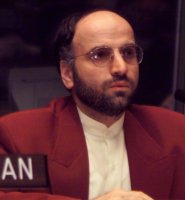 |
Co-Chairs
of the Ad Hoc Open-Ended Intergovernmental Group of Experts
on Energy and Sustainable Development:
Mohammed Reza Salamat (Iran) and Irene Freudenschuss Reichl
(Austria)
|
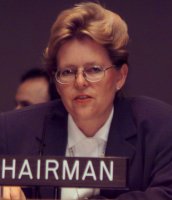 |
 Mohammed
Salamat noted that the
Group's next meeting should take place before February 2001.
The Group intends to work closely with the CSD-9 Chair and Bureau
of CSD-9 as they would like the focus of the CSD-9 to be on renewable
energy and sustainable development, involving the added participation
of Energy Ministers.
Mohammed
Salamat noted that the
Group's next meeting should take place before February 2001.
The Group intends to work closely with the CSD-9 Chair and Bureau
of CSD-9 as they would like the focus of the CSD-9 to be on renewable
energy and sustainable development, involving the added participation
of Energy Ministers.
 Irene
Freudenschuss Riechl
underlined the importance of intersessional events as the
place where key issues are identified. She made an appeal
to all governments to make voluntary contributions to fund the participation
of developing countries at the working group so that they may
together start identifying solutions
to key issues of relevance to all countries. Since the first
session was about identifying issues, she proposed that the second
session be focused on determining solutions.
Irene
Freudenschuss Riechl
underlined the importance of intersessional events as the
place where key issues are identified. She made an appeal
to all governments to make voluntary contributions to fund the participation
of developing countries at the working group so that they may
together start identifying solutions
to key issues of relevance to all countries. Since the first
session was about identifying issues, she proposed that the second
session be focused on determining solutions. |
|
|
 The
Secretary of the CSD assured
recommendation for the establishment of the UN Forum on Forests
(UNFF) as an intergovernmental forum to the GA. The proposed
UNFF would be open to all states, meet annually with a high-level
ministerial segment, should set up a compact secretariat, and
take on a program of activities according to the Rio Declaration,
Ch.II of Agenda 21, and IFF proposals for action.
The
Secretary of the CSD assured
recommendation for the establishment of the UN Forum on Forests
(UNFF) as an intergovernmental forum to the GA. The proposed
UNFF would be open to all states, meet annually with a high-level
ministerial segment, should set up a compact secretariat, and
take on a program of activities according to the Rio Declaration,
Ch.II of Agenda 21, and IFF proposals for action.
|
 Dick
Balhorn (Canada) highlighted the IFF as one of most
significant decisions of CSD and one of the best examples of what
the CSD can do when it is focused on an issue. Balhorn
made further comments encouraging the CSD to keep
the high level segment relevant to its meetings, ensuring interesting
multi-stakeholder dialogues, limiting running times on speeches,
and attracting Ministerial presence, closing on the desire to
see Mayr at the Rio+10 event.
Dick
Balhorn (Canada) highlighted the IFF as one of most
significant decisions of CSD and one of the best examples of what
the CSD can do when it is focused on an issue. Balhorn
made further comments encouraging the CSD to keep
the high level segment relevant to its meetings, ensuring interesting
multi-stakeholder dialogues, limiting running times on speeches,
and attracting Ministerial presence, closing on the desire to
see Mayr at the Rio+10 event.
|
|
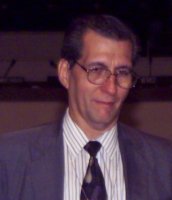 |
 Modesto
Francisco Fernandez Diaz-Silveira (Cuba) related that
even as a small country, it has sustainable development success
stories, having regenerated 20% of its forests. CSD was complimented
as an appropriate forum to deal with all these converging topics,
and has the power to make decisions that will have important effects
for sustainable development and for the planet.
Modesto
Francisco Fernandez Diaz-Silveira (Cuba) related that
even as a small country, it has sustainable development success
stories, having regenerated 20% of its forests. CSD was complimented
as an appropriate forum to deal with all these converging topics,
and has the power to make decisions that will have important effects
for sustainable development and for the planet.
|
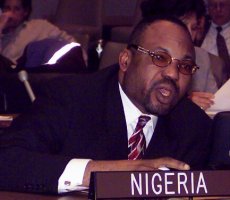 |
On the location of Rio+10,
the US, opposed by Japan (right) and Nigeria, for the G-77/China,
dissociated himself from consensus that the event be held in a developing
country; the US does not support the convening of any new conferences
within the UN system |
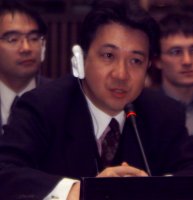 |
|
 Mark
Hambley, US, stated its understanding that Rio+10 should
be a global conference held outside New York; that it supports the
10 year review that takes into consideration major changes; but
in light of general US policy, the US will not contribute funding
for any new global conferences. With respect to the IFF/UNFF, the
the US underscored its support for the creation of the
panel, and noted its financial contributions amounting to some $700,000.
Mark
Hambley, US, stated its understanding that Rio+10 should
be a global conference held outside New York; that it supports the
10 year review that takes into consideration major changes; but
in light of general US policy, the US will not contribute funding
for any new global conferences. With respect to the IFF/UNFF, the
the US underscored its support for the creation of the
panel, and noted its financial contributions amounting to some $700,000.
|
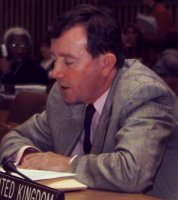 |
|
|
CSD-8
Chair Mayr talks
to the press after suspending the Closing Plenary and before leaving
to return to Colombia
|
| Highlights
from the final hours of negotiations |
| The Contact Group on Land and Agriculture
resolves outstanding issues on integrated planning and management
of land resources |
| When
informal informal consultations failed to resolve the issue
regarding reference to "equal" regarding access to
land and security of tenure, facilitator Navid Hanif proposed
that this reference be retained only once (instead of throughout
the document), within language on promoting improved access
and tenure. Following additional discussion, the agreed text
states: "while recognizing the existence of different national
laws and/or systems of land access, governments, at appropriate
level, including the local authorities, are encouraged to develop
and or adopt policies and implement laws that guarantee to their
citizens well defined and enforceable land rights and promote
equal access and security of tenure." Above
photo: Ositadinma Anaedu, Nigeria, Ambassador Mark Hambley,
US, and Ambassador Julio Mascarenhas, Portugal; Bottom
left photo: Modesto
Francisco Fernandez Diaz-Silveira,
Cuba, and Facilitator Navid Hanif |
|
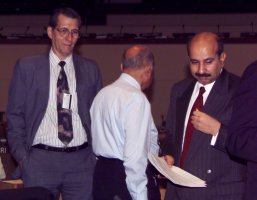 |
On prevention
and/or mitigation of land degradation, a reference to protection
and enhancement of greenhouse sinks, proposed by Australia, generated
support from the US and EU and opposition from the G-77/China, Brazil
and Egypt. The reference was changed to "carbon sequestration,"
and was also proposed and debated under the section on international
cooperation. The contact group succeeded in creating an acceptable
compromise proposal, and the reference was kept in the latter section
only. A new paragraph specifically addressing the removal of land
mines was debated and agreed to in informal discussions, reflecting
language from GA resolution 5326. Delegates also agreed to language
urging countries to sign and ratify the Biosafety Protocol and to
support its effective implementation
Contact
group facilitator
Navid Hanif
aired by Navid Hanif (Pakistan) with Cuba (left)
|
| Negotiations on the Draft
Decision on Agriculture |
During the
early afternoon, delegates debated language on prioritization
of sources for financing SARD. When consensus could not be reached
on language regarding domestic and international sources, some
delegates proposed deletion of the SARD section. Delegates agreed
to broader text stating the the financing for the implementation
of Agenda 21is expected to be met, in general from domestic resources,
and that all governments are urged to provide an enabling environment
for mobilizing domestic and international resources.
Facilitator
Navid Hanif
consults with delegates on text under SARD
|
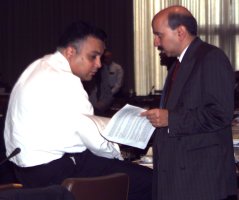
|
|
|
In the
early morning hours: Canada, Australia and Nigeria (above left)
consult
on text regarding sanitary and phytosanitary measures.
|
The final
hour for agriculture: text was agreed to at approximately 2:00
am. In this photo, the US, Australia, the G-77, Canada and
the EU consult on the last outstanding paragraph on sanitary
and phytosanitary measures.
Delegates
agreed to text stating that: "Sanitary and phytosanitary
measures are relevant to SARD. Their implementation must be in
accordance with WTO agreements."
|
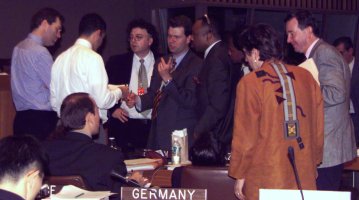
|
|
Drafting Group II: Financial Resources and
Mechanisms
Drafting
Group II completed its work on finance, sending two paragraphs with
internal brackets to Plenary. Contentious issues in the group included
references to governance. The EU preferred using "good" governance,
whereas the G-77/China supported "responsive to the needs
of the people, based on efficient, participatory, transparent and
accountable public service, policy-making processes and administration,"
which is text from GA Resolution 54/231. After informal consultations,
delegates agreed on "transparent, effective, participatory and accountable
governance, conducive to sustainable development and responsive
to the needs of people." Delegates could not agree on the strength
of action to be taken on trade-distorting and environmentally harmful
subsidies. Text on the gradual phasing out of these subsidies remained
in brackets. New Zealand, the US and other preferred elimination
of such subsidies. Regarding a paragraph implementing the HIPC initiative,
delegates in Drafting Group II could not reach consensus on a reference
to cancellation and "equivalent relief" of bilateral official
debt to countries qualifying for the enhanced HIPC initiative.
|
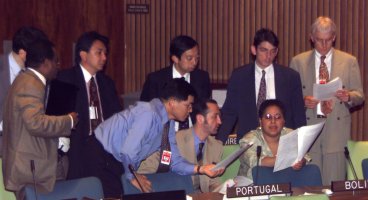 |
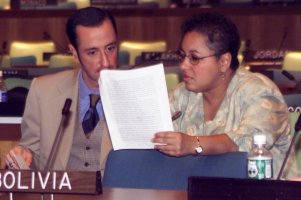 |
| Alison Drayton, Guyana, coordinated
finance for the G-77/China Pictured
with Chair Seok-young, the EU, and other G-77/China (left) and
with Portugal (right ) Pictured on the right with the representative
of Portugal. Considerable debate also ensued on language referring
to the creation an ad hoc intergovernmental panel to undertake
an analytical study of the lack of progress in the fulfillment of
financial commitments. The final text reflects that no agreement could
be reached on convening such a panel. |
The EU
consults on finance outside the Trusteeship Council
Consensus
was elusive on text regarding the Clean Development Mechanism
and the Kyoto Protocol under innovative financial mechanisms.
Australia, Canada, the EU, New Zealand and Norway supported
clear reference. The US stated that it could not accept
text in any formulation. The G-77/China emphasized that
because the CDM was not yet negotiated, they could not agree on
any language. Reference to the CDM was deleted from the text.
|
|
|
|
Drafting
Group II met in the Trusteeship Council in the afternoon, a
change of scenery from the basement of the UN building
|
Drafting Group II: Trade
The Drafting Group finished its work at 2:30 am on Saturday morning
and sent the draft decision on trade to Plenary with three paragraphs
still containing internal brackets.
Consensus
could not be reached on: enhancing understanding of the economic
and social implications of trade measures for environmental purposes
for countries at different levels of development; on relaxing
environmental standards to attract FDI; further research on the
Rio Principles. The draft decision was sent to Plenary with brackets.
|
|
New
Zealand (left center)
facilitated informal discussions on paragraphs in the trade text
related to, inter alia, sustainability impact assessments,
trade distorting and environmentally harmful subsidies.Delegates
had difficulty reaching consensus on text regarding environmental
impact and sustainability assessments of trade agreements. The G-77/China
maintained that language on assessments might be used later as a
conditionality on trade. Norway suggested text on the developmental
and environmental implications of trade barriers and on financial
and technical support for countries undertaking environmental impact
and sustainability assessments of trade agreements.
|
|
The
European Commission and the US (above) discuss the
trade text. The European Commission is pictured on the right.
|
Bolivia
and Egypt
The G-77/China
preferred deletion of the text stating that environmental
standards should not be lowered as a means to attract FDI, while
the EU noted that similar language was accepted at CSD-4.
|
|
| Passing the time, waiting for the Final
Plenary to convene |
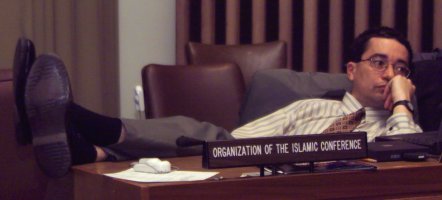 |
Some
kicked back and relaxed, some caught up on well needed sleep, some
read the ENB and some posed for photos. |
The resumed Closing
Plenary convened at 3:30 am on Saturday morning
Chair
Choi Seok-young (Republic of Korea) presided over the Final Plenary.
After deleting bracketed text which could not be resolved in both
the Finance and the Trade Draft Decisions, delegates adopted all four
Draft Decisions on land, agriculture, finance and trade. Plenary also
adopted the agenda for CSD-9 which includes energy, atmosphere, transport,
information for decisonmaking, and participation and international
cooperation for an enabling environment. The first meeting of CSD-9
convened briefly in order to elect following Bureau members: CSD-9
Chair Bedrich Moldan (Czech Republic) and Vice-Chairs David Stuart
(Australia), Alison Drayton (Guyana) and Matia Kiwanuka (Uganda).
The representative of the Asia group will be elected at a later date. |
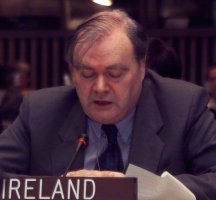 |
Drafting
Group I Chair Patrick McDonnell (Ireland) stated that, after
initial negotiations in the group, intensive negotiations had been
concluded in a contact group facilitated by Navid Hanif, and consensus
had been reached on all outstanding paragraphs. Chair McDonnell
reported that the papers on land and agriculture had been adopted
by the Drafting Group and thanked the facilitator, the Secretariat
and delegations. The decisions on Integrated Planning and Management
of Land Resources and on Agriculture were adopted.
|
Chair
Choi Seok-young (Republic of Korea) reported on the results
of Drafing Group II on trade and finance, noting the texts still
contained brackets. In the finance paper, delegates agreed
to delete text on the "gradual phasing out" of trade-distorting
and environmentally harmful subsidies, and cancellation "and
equivalent relief" of bilateral official debt to HIPC countries.
On the trade paper, delegates agreed to delete bracketed
text referring to: enhancing understanding of the economic and
social implications of trade measures for environmental trade
purposes; the inappropriateness of relaxing environmental laws,
regulations, standards or their enforcement in order to encourage
FDI or to promote exports; and researching possible trade implications
and applications of the Rio principles of common but differentiated
responsibilities, the polluter pays principle and the precautionary
principle.
|
|
|
|
 Ositadinma
Anaedu, Nigeria, for the G-77/China said
that the solutions agreed on will trickle down in a substantial
way to those they are meant for for the betterment of sustainable
development. He said that each time he enters the process, he
emerges as an improved person and has increased his understanding
of different cultures.
Ositadinma
Anaedu, Nigeria, for the G-77/China said
that the solutions agreed on will trickle down in a substantial
way to those they are meant for for the betterment of sustainable
development. He said that each time he enters the process, he
emerges as an improved person and has increased his understanding
of different cultures.
|

 ENB
Summary of Ad Hoc Open-Ended Intergovernmental Group of Experts on Energy
and Sustainable Development ENB
Summary of Ad Hoc Open-Ended Intergovernmental Group of Experts on Energy
and Sustainable Development
 CSD-8
Intersessionals CSD-8
Intersessionals
 Linkages
CSD page Linkages
CSD page
 UN
- CSD website with official
documents UN
- CSD website with official
documents
 ENB's
"Introduction to CSD" ENB's
"Introduction to CSD"

|


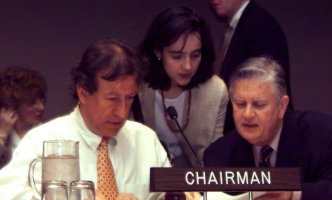
 Click
here for highlights and photos from the negotiations
Click
here for highlights and photos from the negotiations

